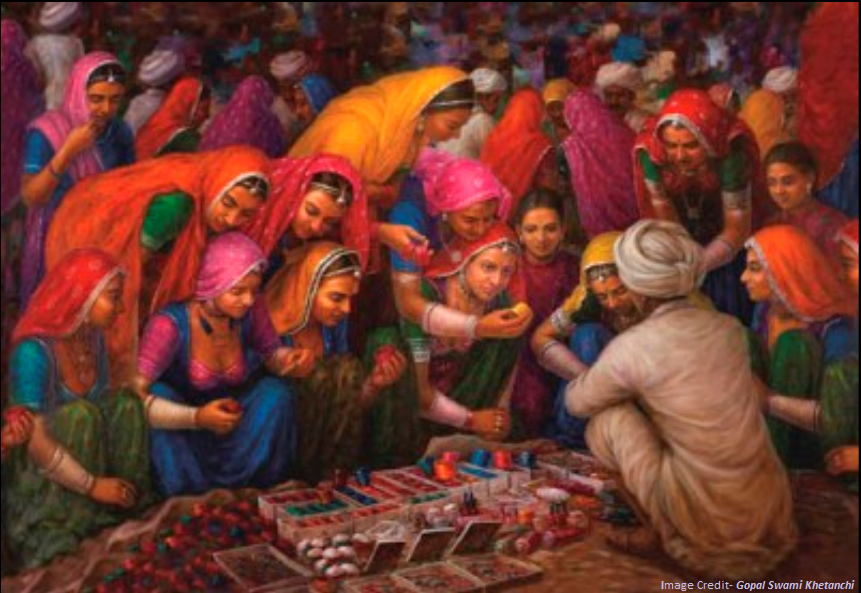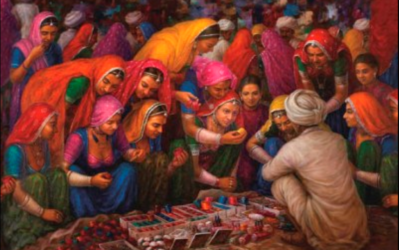
When I think of a market, what flashes into my mind is a myriad of colors, sounds and things. The Indian market could not be put into a box – it leapt out at you with its innovative modes of selling, personalized service or simply the sheer convenience of it! It could appear anywhere and everywhere where a few people had something to sell or where a few expressed a need to buy.
I remember the sheer joy of school and college days when we would walk down a Linking Road or Colaba market to pick up the latest in style in shoes, dresses or even lingerie! I remember the sidewalks of Connaught Place or Janpath lined with sellers with their impromptu shops selling everything from clothes, shoes, bags, to jewelry and what have you! Remember window shopping with friends? Browsing through the wares of street-side vendors, espying a few things we wanted to buy and the hard bargains that would follow! When I look back, the extent of the choice available in styles of clothing, foods, etc. was mind boggling!
And who can forget the lines of roadside thelawalas (cart vendors) outside colleges, along the beaches and even outside film theatres, selling the yummy chaats, samosas, pani puri, wada pav or pav bhaji, depending on which city you happened to be in. To be followed with either a kulfi or ganna ka ras (sugarcane juice), a garam chai or even a paan, all prepared in front of you and served in eco-friendly leaf plates or little earthenware pots. And of course, you did not have to go far for those either – they were available close by – made by local artisans.
Our generation would also remember perhaps the pheriwalas (wandering salesmen), who would appear at your doorstep selling all kinds of goods, some that you could not do without and some you didn’t really want but which were too hard to resist! I remember visiting my grandmother’s house as a child and being surprised that every morning (before sunrise!) someone left a little bundle of flowers, nicely wrapped in a leaf and tied with jute chord, at the doorstep. It had flowers for the morning puja (prayers) – a little jasmine garland, some marigold, bel-patra, tulsi and other seasonal flowers. My grandmother told me it was the phoolwali (women who sold flowers) – it was always the women who brought the flowers, whether to your home or outside the temples! Years later when I happened to stay in Gurgaon for a few months in an apartment, I asked if there was such a service available there and to my utter amazement and delight, I found that there was! The only difference was that now it was a man delivering the flowers in a plastic bag, transported in a three-wheeler or his bike (for me a sad commentary on the so called ‘progress’ our country has made).
These wandering salesmen did not just supply you goods, they became very much a part of your daily life and celebrations. Be it the choodiwala (bangle seller), who magically appeared before every teej / karva chauth with his woven basket, laden with colorful glass bangles made by local craftsmen, or the potters with their ghadas (round clay pots for keeping water cool) / surahis (tall clay pots with long spouts) in summer and diyas during Diwali, even bringing the oil used for lighting these diyas! And how can I not mention the ubiquitous sabziwalis (vegetable sellers – again mostly women), who would appear every day at your door calling out “Sabzi le lo”! Fresh home-grown vegetables straight from the fields – no fear of chemicals or GMOs. Such conveniences!
Their import in our life and culture is immortalized by no less than the great litterateurs of their times, Ranbindranath Tagore’s touching story of the Kabuliwala, or Sarojini Naidu’s poem The Bangle Seller, evocative of a woman’s hopes and dreams. Mind you, these pheriwalas were not unique to the Indian market, they came from far and wide – the Kabuliwala came from Kabul, Afghanistan (thus the acronym) carrying his load of walnuts and dates and became an integral part of the local economy.
Today when I need to buy anything, I drive to a large mall some miles away, park my car in the multistoried parking space, and go up an elevator to an air-conditioned multistoried shopping mall housing many big brands, showcasing the latest in fashion and technology. Or better still I don’t even need to step out of my home but can buy whatever I want, be it a bulky sofa set or fine jewelry, from the comfort of my couch! And lo and behold! In a few days in appears at my doorstep! The delivery man either leaves it at my door or rings my bell to get a signature on an ipad.
The market has evolved….. or has it? What has changed?
The more it changes, the more it remains the same…..
But I miss the call of the pheriwala, the jingle of bells of the ice-cream seller, the noise and smells emanating from the food stalls and the excitement of a bargain well done, leaving both happy and satisfied with the deal. I miss meeting those who craft, embodying their wares with small moments from their lives, and the beautiful smiles when the exchange is made with a promise to treasure what has so lovingly been created.
Is the pheriwala lost forever in the labyrinth of the neural networks of modern computing? Or can he be resurrected once again – perhaps in a new avatar? Retailers would perhaps regain their unique selling proposition by reviving this denizen of the past to recreate the magic of the shopping experience.
Watch this space for what E3/ISS has in store…
Author: Babita Shekhar is an Advisory Board Member of iE3 Innovations Pvt. Limited, a technology firm.



A good walk through my childhood memories…. The dosawala striking his iron tawa with the tong, the kulfi wala, with his brass bell,, each had a different call… Those sounds still ring fresh in our minds. And the psychological satisfaction of bargaining for a few pennies…. The list is endless… The wool Walla in the beginning of winters, the palm leaf fans, arrived with the onset of summers…. They knew their times….